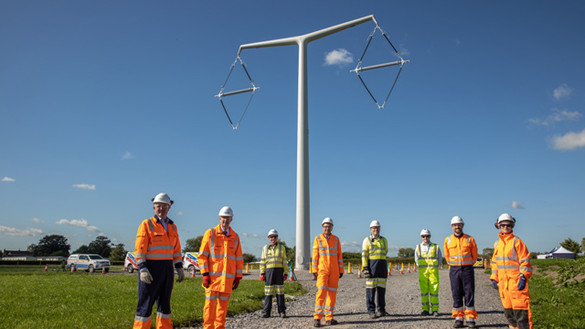
I didn't study STEM subjects at school
There are lots of routes into engineering, as Andrew Henderson discovered when his fascination with electricity switched his career goals and helped him see how exciting a career as an engineer can be.
Hi, I’m Andrew and I'm a Power Systems Engineer at National Grid ESO, the electricity system operator for Great Britain.
My job is to check that the transmission network operates securely and safely when circuits or assets are switched out of service for maintenance or reinforcements.
I didn’t study STEM subjects at school, so I didn’t think engineering was a potential career for me – until I did a foundation year at Loughborough University in Science and Engineering.
Lightbulb moment
After taking Business Studies, ICT and History at A-Level, I thought I would go on to study Computer Science, but then I became fascinated by electricity in one of my foundation modules. We all take electricity for granted – being able to have it at the flick of a button to light your home or make your cup of tea – but our economies and wellbeing from warmth and light are so dependent on electricity and how it gets to us.
My advice to anyone who may be interested in a career in engineering is to look at all the routes in…
My advice to anyone who may be interested in a career in engineering is to look at all the routes in, like taking a university foundation year and apprenticeships if you do not already study STEM subjects. Through taking the foundation course into a degree route, I was able to achieve a first class in Electronic and Electrical Engineering.
Engineering hero
One of the inspirations for my interest in engineering is Nikola Tesla, who significantly contributed to the development of the alternating current (AC) generation and transmission technology over 140 years ago – the foundation of all modern-day power systems. His inventions revolutionised how electricity could be transported and made increasingly accessible to everyone.
The two most important skills to be an engineer are thinking outside the box with problem solving and being able to communicate your ideas. A big part of my role is communicating with customers and stakeholders, as well as my own team.
The two most important skills to be an engineer are thinking outside the box with problem solving and being able to communicate your ideas.
The best thing about working for NGESO is solving complex challenges as a team, which when broken down into parts become achievable. The most ambitious target we are working on now is achieving a sustainable energy future. If you’re concerned about global warming, being an engineer here means you can play a significant role in achieving net zero carbon emissions for Great Britain.
Pandemic opened up possibilities
My career highlight so far was during the first coronavirus lockdown, when a transmission plan I’d created had to be cancelled and redone from scratch due to all the work constraints for construction workers. It was more work, but obviously important to work around the safety requirements for field workers.
I was really surprised and pleased when my manager nominated me for a Young Energy Professionals award for ‘Outstanding achievement in responding to COVID-19’, where I was shortlisted from over 100 people. It turned out to be a great success for the team and rewarding for myself.


